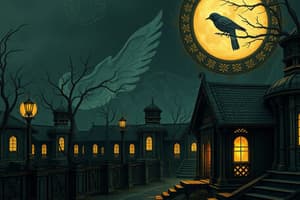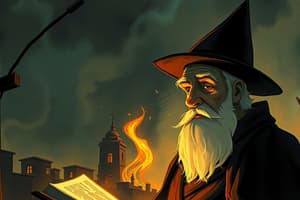Podcast
Questions and Answers
What emotional change occurred in Elie after his first night in the camp?
What emotional change occurred in Elie after his first night in the camp?
- He felt a loss of faith and innocence. (correct)
- He began to trust the guards more.
- He developed a strong sense of hope.
- He became more resilient and determined.
Why were Elie's shoes allowed to remain with him?
Why were Elie's shoes allowed to remain with him?
- The guards overlooked them due to their appearance. (correct)
- They were brand new and out of style.
- They were hidden in a secret compartment.
- They were too small for anyone to notice.
What is the irony behind the sign stating, 'Work makes you free' at Auschwitz?
What is the irony behind the sign stating, 'Work makes you free' at Auschwitz?
- It encouraged prisoners to endure despite harsh conditions.
- Prisoners were actually given a chance to escape.
- Workers were rewarded generously for their efforts.
- No prisoner ever achieved freedom through work. (correct)
What was the role of a Lagerkapo in the concentration camp?
What was the role of a Lagerkapo in the concentration camp?
What did Elie and his companions learn from veteran prisoners at Buna?
What did Elie and his companions learn from veteran prisoners at Buna?
How did Idek react when Elie laughed at him with a woman?
How did Idek react when Elie laughed at him with a woman?
What was Elie's main feeling when he saw Idek beat his father?
What was Elie's main feeling when he saw Idek beat his father?
What did Franek do to Elie to force him to give up his gold crown?
What did Franek do to Elie to force him to give up his gold crown?
How do sentence fragments enhance the tone and mood in the story?
How do sentence fragments enhance the tone and mood in the story?
What was Elie's unexpected reaction to his father being punished?
What was Elie's unexpected reaction to his father being punished?
What does the term 'lamentation' refer to?
What does the term 'lamentation' refer to?
What was ironic about wishing a Happy New Year in the context of Elie's experience?
What was ironic about wishing a Happy New Year in the context of Elie's experience?
Why did some prisoners debate whether to fast on Yom Kippur?
Why did some prisoners debate whether to fast on Yom Kippur?
What was described as a 'New Year's gift' from the SS to the prisoners?
What was described as a 'New Year's gift' from the SS to the prisoners?
What advice did the head of the block give regarding the selection process?
What advice did the head of the block give regarding the selection process?
What does Elie refer to when he mentions 'the inheritance' after his father's number is taken?
What does Elie refer to when he mentions 'the inheritance' after his father's number is taken?
What was Moshe the Beadle's relationship to the narrator?
What was Moshe the Beadle's relationship to the narrator?
What was the initial response of the townspeople of Sighet to Moshe's warnings?
What was the initial response of the townspeople of Sighet to Moshe's warnings?
What did Moshe pray for?
What did Moshe pray for?
How did Elie perceive his father's tears when they were forced to leave their home?
How did Elie perceive his father's tears when they were forced to leave their home?
What was the tone of the people of Sighet in the spring of 1944?
What was the tone of the people of Sighet in the spring of 1944?
What did the Jews of Sighet have to prepare when they were deported?
What did the Jews of Sighet have to prepare when they were deported?
How were the ghettos described?
How were the ghettos described?
What did Madame Schachter do on the train that upset the passengers?
What did Madame Schachter do on the train that upset the passengers?
What was the common misconception about Auschwitz that the arriving prisoners held?
What was the common misconception about Auschwitz that the arriving prisoners held?
Why did Elie and his father lie about their ages when questioned by the SS?
Why did Elie and his father lie about their ages when questioned by the SS?
What phrase did Elie remember from his last moment with his mother?
What phrase did Elie remember from his last moment with his mother?
What type of officer was a noncommissioned officer in the context of the camps?
What type of officer was a noncommissioned officer in the context of the camps?
What prompted Elie to start questioning his faith in God?
What prompted Elie to start questioning his faith in God?
What literary device is defined as providing hints or warnings about future events?
What literary device is defined as providing hints or warnings about future events?
What was the role of the Kapos in the concentration camps?
What was the role of the Kapos in the concentration camps?
What effect did the rumors of comfortable living conditions have on the prisoners?
What effect did the rumors of comfortable living conditions have on the prisoners?
What does the statement, 'How well they were treating me! Like an orphan!' ironically convey?
What does the statement, 'How well they were treating me! Like an orphan!' ironically convey?
What was the reason Elie had to go to the hospital?
What was the reason Elie had to go to the hospital?
What does Wiesel mean by referring to the rumors of the front moving closer as 'an injection of morphine'?
What does Wiesel mean by referring to the rumors of the front moving closer as 'an injection of morphine'?
Why did Elie leave the hospital earlier than expected?
Why did Elie leave the hospital earlier than expected?
What effect does the focus on night have on the tone of the story?
What effect does the focus on night have on the tone of the story?
How did Rabbi Eliahou influence the prisoners?
How did Rabbi Eliahou influence the prisoners?
What was the irony in the prisoners' reaction to the order to throw corpses from the train?
What was the irony in the prisoners' reaction to the order to throw corpses from the train?
How many prisoners survived the journey to Buchenwald out of the original hundred?
How many prisoners survived the journey to Buchenwald out of the original hundred?
Flashcards
Who was Moshe the Beadle?
Who was Moshe the Beadle?
Moshe was a poor, humble, and devout Jewish man who lived in Sighet.
When does the story begin and how old is Elie?
When does the story begin and how old is Elie?
The story begins in 1941 when Eliezer was 12 years old.
Describe Eliezer's family.
Describe Eliezer's family.
Eliezer had three sisters and a family business. His father was respected in the community.
What did Moshe pray for?
What did Moshe pray for?
Signup and view all the flashcards
How did the townspeople of Sighet react to Moshe's warnings?
How did the townspeople of Sighet react to Moshe's warnings?
Signup and view all the flashcards
What was the attitude of the people of Sighet in the spring of 1944?
What was the attitude of the people of Sighet in the spring of 1944?
Signup and view all the flashcards
What happened around Passover in 1944?
What happened around Passover in 1944?
Signup and view all the flashcards
Describe the ghettos.
Describe the ghettos.
Signup and view all the flashcards
Birkenau
Birkenau
Signup and view all the flashcards
Auschwitz
Auschwitz
Signup and view all the flashcards
Foreshadowing
Foreshadowing
Signup and view all the flashcards
Verbal Irony
Verbal Irony
Signup and view all the flashcards
Kapos
Kapos
Signup and view all the flashcards
Irony of the Situation
Irony of the Situation
Signup and view all the flashcards
The Burning of Children
The Burning of Children
Signup and view all the flashcards
Dr. Mengele
Dr. Mengele
Signup and view all the flashcards
What is ironic about the death's head mark on the electric fencing?
What is ironic about the death's head mark on the electric fencing?
Signup and view all the flashcards
What is ironic about the sign over the entrance to Auschwitz?
What is ironic about the sign over the entrance to Auschwitz?
Signup and view all the flashcards
Where were Elie and his father assigned?
Where were Elie and his father assigned?
Signup and view all the flashcards
What number was Elie assigned?
What number was Elie assigned?
Signup and view all the flashcards
Why did Elie lie to Stein?
Why did Elie lie to Stein?
Signup and view all the flashcards
Why was Elie allowed to keep his new shoes?
Why was Elie allowed to keep his new shoes?
Signup and view all the flashcards
How did Elie feel when Idek beat his father?
How did Elie feel when Idek beat his father?
Signup and view all the flashcards
What advice were Elie and his companions given by veteran prisoners at Buna?
What advice were Elie and his companions given by veteran prisoners at Buna?
Signup and view all the flashcards
Lamentation
Lamentation
Signup and view all the flashcards
Mirage
Mirage
Signup and view all the flashcards
Countenance
Countenance
Signup and view all the flashcards
Atonement
Atonement
Signup and view all the flashcards
Reprieve
Reprieve
Signup and view all the flashcards
Interminable
Interminable
Signup and view all the flashcards
Emaciated
Emaciated
Signup and view all the flashcards
Crucible
Crucible
Signup and view all the flashcards
What is ironic about the statement, "How well they were treating me! Like an orphan!"
What is ironic about the statement, "How well they were treating me! Like an orphan!"
Signup and view all the flashcards
What does Wiesel mean by "an injection of morphine" when referring to the rumors of the front moving closer?
What does Wiesel mean by "an injection of morphine" when referring to the rumors of the front moving closer?
Signup and view all the flashcards
Why did Elie leave the hospital early? Was his decision a good one?
Why did Elie leave the hospital early? Was his decision a good one?
Signup and view all the flashcards
How does the focus on night affect the tone of the story in Chapter 5?
How does the focus on night affect the tone of the story in Chapter 5?
Signup and view all the flashcards
What effect did Rabbi Eliahou have on the prisoners? What sad event did Elie witness relating to the Rabbi?
What effect did Rabbi Eliahou have on the prisoners? What sad event did Elie witness relating to the Rabbi?
Signup and view all the flashcards
What is ironic about the prisoners' reaction to the order to throw the corpses from the train into the field?
What is ironic about the prisoners' reaction to the order to throw the corpses from the train into the field?
Signup and view all the flashcards
What is the effect of Elie's descriptions of the cries of the dying prisoners?
What is the effect of Elie's descriptions of the cries of the dying prisoners?
Signup and view all the flashcards
How many of the prisoners originally loaded into the train car survived the journey to Buchenwald?
How many of the prisoners originally loaded into the train car survived the journey to Buchenwald?
Signup and view all the flashcards
Study Notes
Getting Things Straight
- Moshe the Beadle was poor, humble, and deeply religious.
- The story begins in 1941 while the narrator was 12 years old.
- The narrator's family owned a shop and his father was respected in the community.
- Moshe prays to understand God's will. Moshe tells of escaping and witnessing the killing of Jews as he tells about his prayers.
- The townspeople of Sighet initially didn't believe Moshe, thinking him crazy, and weren't concerned about the impending deportations.
- The attitudes in Sighet were optimistic leading up to Passover in 1944, not believing there was any danger.
- The Germans arrived in 1944; they implemented rules and controlled the Jewish lives.
- The ghettos were fenced-off areas forcing the Jews to live, crowded, and isolated.
- The Jews of Sighet had a limited time given to prepare and take few possessions for the deportations.
Additional Information
- Elie was 15 and his father was 50, but they told the SS their ages were 18 and 40 to avoid being killed.
- Townsfolk tried to adapt to the ghettos, viewing it as temporary.
- The narrator and neighbors realized they were being taken from Hungary when the train crossed the border.
- Madame Schachter screamed about fire and furnaces; passengers beat her to silence her.
- Rumors spread about Auschwitz; it was initially believed to be a camp with good conditions for families.
- Prisoners assigned to supervise other prisoners are called Kapos.
Studying That Suits You
Use AI to generate personalized quizzes and flashcards to suit your learning preferences.




